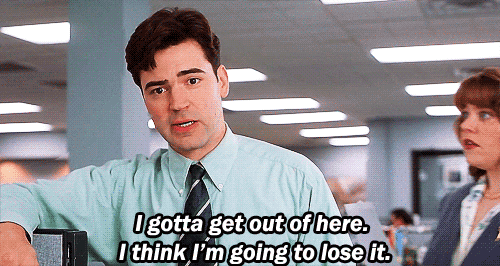According to experts from the World Health Organization (WHO) and the International Labour Organization (ILO), each year three-quarters of a million people are dying from heart disease and stroke due to working long hours. Overwork is literally killing us.
Have a date? Want to play with your kids? Or just a burning desire to get out of the office and enjoy some sunshine?
Whether you're chained to a desk or working remotely in your pajamas, we've got some strategies to help you make a break for it and start your weekend shenanigans ahead of schedule. It just might save your life 😉.

For Remote Workers
First, set boundaries
Working from home can blur the lines between work and personal life. That’s why it’s important to set clear boundaries between when you’re working and when you’re not. For example, have a designated workspace where you only do work-related activities; avoid checking work emails or calls after hours; communicate with your boss and co-workers about when they can expect responses from you; etc.
Take advantage of WFM flexibility
One of the perks of working remotely is that you have more control over your schedule than office workers. You can adjust your hours according to your preferences, productivity levels, and personal obligations.
For example, if you’re more productive in the morning, you can start earlier and finish earlier; if you have a doctor’s appointment in the afternoon, you can take a longer break then; if you want to catch up with a friend who lives in another timezone, you can shift some tasks to later in the day; etc.
The good stuff: A library of our favorite excuses
Sometimes, you just need to have a good excuse ready to eject from work. Let's think about some really good examples that could pass as totally valid and impossible to deny:
Car Troubles: "My car broke down, and I need to deal with it immediately."
An illness: "I'm not feeling well, and I think I might be coming down with something."
A doctor’s appointment: "I have a previously scheduled doctor's appointment."
A family emergency: "I'm sorry, but I've just received news of a family emergency" or "The school nurse just called and I need to pick up my kids".
A volunteer commitment: "I have a volunteer commitment that I can't miss."
An important delivery: "I'm expecting an important delivery, and I need to be there to receive it."
An internet issue: "I don't know what happened, my internet went out and I can't log in."
A personal appointment: "I have a personal appointment that I can't reschedule."
A home disaster or repair: "I have a plumber/electrician coming to fix something at home."
A mental health day: "I'm feeling overwhelmed and need a mental health day."
A career development event: "I'll be out-of-office at a conference, mostly unavailable."
A beginning or end-of-day meeting: "I'm meeting with a client off-site, so I need to leave at 3pm to get there in time."
Be sure to be vague about the details if possible, don’t overdo it with too many excuses (or too often), and apologize for any inconvenience.
Inform your team & set an out-of-office status
There are times when you just can't disappear without telling anyone. In these instances, you'll need to be transparent about when and how much you’re working and how much you’re working.
For example, you can use tools like Slack, Teams, or Google Calendar to update your status, share your progress, and show your availability. You can also send regular reports or updates to your boss and co-workers to keep them in the loop.
Or, just pretend you’re still there
Sometimes, the best way to sneak out of work is to pretend that you’re still there. Leave some clues behind to make it seem like you’re still working (even though you’re already enjoying your free time). These clues could include:
- An open document or spreadsheet on your computer screen
- A half-written email or message on your chat app
- Our favorite: Open a Google Slides presentation and go into "Slideshow" presentation mode. This prevents your computer from falling asleep, thus making it appear you're still active.
These tricks can help you avoid getting caught by anyone who tries to contact you while you’re gone.
For Office Workers
Show up on time
This may sound counterintuitive, but showing up on time (or even early) can help you build trust and credibility with your boss and co-workers. It also gives you more time to finish your tasks and clear your schedule for the afternoon.
Stay organized
Keep track of your deadlines, meetings, and projects so that you can prioritize what needs to be done before you leave. Use tools like calendars, planners, or apps to help you stay on top of your workload.
Get ahead of your work
If you know in advance that you want to leave early, plan ahead and get as much work done as possible beforehand. You can also delegate some tasks to others or ask for extensions if necessary. Make sure you have everything ready for the next day so that you don’t leave any loose ends behind.
Beware of time stealers
Avoid distractions like social media, chatty co-workers, or unnecessary meetings that can eat up your precious time. Focus on the most important and urgent tasks first and save the rest for later.
Figure out where your lost time goes
Sometimes we waste time without even realizing it. Track how much time you spend on different activities throughout the day and identify where you can cut back or eliminate some of them. For example, do you really need to check your email every 10 minutes? Or can you limit it to once an hour?
Follow THIS rule
One way to leave work early is by using the 80-20 rule. It’s an easy rule to follow. It simply means that only 20% of your work needs to be 100% perfect. The rest can be good enough or even mediocre (as long as it doesn’t affect your reputation or performance). This way, you can save time and energy by not overdoing it on every task.
Plan on leaving early
Don’t wait until the last minute to announce that you’re leaving early. Instead, let your boss and co-workers know ahead of time (preferably at least a day before) that you have a personal appointment or commitment that requires you to leave early. You don't have to unveil your "reason", we recommend being vague about the details if possible (unless it’s something serious that required an extended leave). This way, they won’t question your motives or try to stop you.
Make your presence felt before 10:30
Many employees come into work, open their email, check their socials, and then disappear into their own world until lunchtime. This makes them seem invisible and unproductive. If you want to leave early, make sure you show up at meetings, contribute ideas, answer questions, and interact with others before 10:30 am. This will make them notice that you’re there and working hard.
Whether you work in an office or remotely, these strategies can help you enjoy some extra time off without compromising your reputation or performance.
Just remember: Don’t get too greedy and don’t get too careless. Otherwise, you may end up losing more than just an hour of work.



Comments